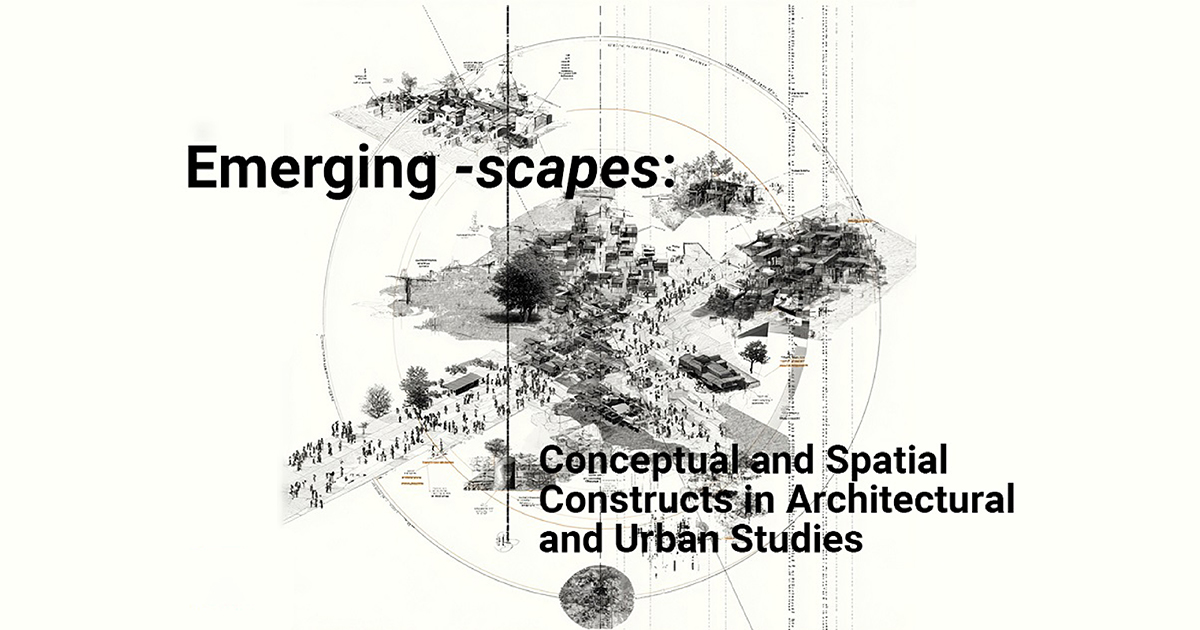Emerging -Scapes: Conceptual and Spatial Constructs in Architectural and Urban Studies
A special issue of Urban Science (ISSN 2413-8851). This special issue belongs to the section "Urban Planning and Design".
Deadline for manuscript submissions: 31 October 2026 | Viewed by 1761

Special Issue Editors
Interests: architectural programming; urban morphology; urban housing; landscape studies; sustainability and heritage
Interests: spatial and urban sociology; social ontology; anthropocene
Special Issue Information
Dear Colleagues,
When Arjun Appadurai introduced the notion of “-scapes” in the early 1990s, he sought to capture the disjunctive, deterritorialized flows that structure our global condition: ethnoscapes, mediascapes, technoscapes, financescapes, and ideoscapes. More than three decades later, the “-scape” is not revisited here out of conceptual nostalgia. Rather, we contend that it remains an underutilized spatial analytic in architectural and urban research—one capable of tracing the radically recomposed conditions of spatial life in the Anthropocene. Urban environments are no longer shaped solely by physical infrastructures but also by planetary degradation, algorithmic governance, and digital sovereignty regimes. In an era marked by ecological urgencies and expanding platform economies, cities emerge less as fixed containers and more as metabolic assemblages—terrains traversed by flows of matter, energy, data, labor, affect, and code. From smart infrastructures and robotic protocols to automated labor regimes, trial ecologies, and retrofitted housing futures, contemporary urban and architectural forms demand new conceptual maps. As recent scholarship shows, the digital and ecological spheres are now co-constitutive forces, reconfiguring governance, perception, and spatial agency.
Against this backdrop, this Special Issue invites contributions that critically engage with the conceptual and spatial paradigm of “-scapes” in architectural and urban studies. The suffix “-scape” has increasingly evolved into a theoretical tool to describe spatial conditions as fluid, multi-layered, and dynamically constructed environments. Building on Appadurai’s influential framework, this Issue explores how architectural and urban thinking can extend and spatialize such imaginaries in response to contemporary global, ecological, and technological transformations.
The overall focus is on how diverse types of “-scapes”, including but not limited to spascapes, servicescapes, soundscapes, datascapes, repair-scapes, platform-scapes, naturescapes, smartscapes, or technoscapes, inform the way we design, perceive, govern, and contest built and unbuilt environments. These scapes are not merely symbolic framings of terrain but perspectival and infrastructural formations, emerging at the intersections of bodies, buildings, sensors, systems, and imaginaries. The scope of this Issue therefore spans empirical, theoretical, and design-based inquiries into emerging landscapes of care and wellness, infrastructure and heritage, ecological systems, digitalization and artificial intelligence, publicness and privatization, and multi-sensory or affective spatial experiences. By foregrounding hybrid or intersecting spatial logics, this Special Issue seeks to open new conceptual and methodological avenues for understanding the production and negotiation of spatial experience.
In doing so, this Special Issue aims to supplement the existing literature by bridging theoretical reflections on global flows and imaginaries with grounded architectural and urban research. While concepts such as landscape urbanism, smart cities, and wellness architecture have attracted scholarly attention, there is a pressing need to reframe them within a more integrative and critical lens that attends to the situated, relational, and speculative dimensions of spatial production. The “-scape” framework offers a valuable conceptual infrastructure to connect diverse research trajectories and foster dialogue across disciplines. We particularly welcome contributions that approach space as an imagined world—experienced, produced, and contested by individuals, institutions, and communities across cultural and geographic contexts.
Dr. Aleksandra Milovanović
Dr. Stefan Janković
Prof. Dr. Vladan Djokic
Guest Editors
Manuscript Submission Information
Manuscripts should be submitted online at www.mdpi.com by registering and logging in to this website. Once you are registered, click here to go to the submission form. Manuscripts can be submitted until the deadline. All submissions that pass pre-check are peer-reviewed. Accepted papers will be published continuously in the journal (as soon as accepted) and will be listed together on the special issue website. Research articles, review articles as well as short communications are invited. For planned papers, a title and short abstract (about 250 words) can be sent to the Editorial Office for assessment.
Submitted manuscripts should not have been published previously, nor be under consideration for publication elsewhere (except conference proceedings papers). All manuscripts are thoroughly refereed through a single-blind peer-review process. A guide for authors and other relevant information for submission of manuscripts is available on the Instructions for Authors page. Urban Science is an international peer-reviewed open access monthly journal published by MDPI.
Please visit the Instructions for Authors page before submitting a manuscript. The Article Processing Charge (APC) for publication in this open access journal is 1800 CHF (Swiss Francs). Submitted papers should be well formatted and use good English. Authors may use MDPI's English editing service prior to publication or during author revisions.
Keywords
- spatial theory
- landscape and urban imaginaries
- urban transformation
- multisensory environments
- situated spatial practices
- hybrid spatialities
- architecture and urban experience
- cultural and social infrastructures
- digital urbanism
- design research methodologies
- interdisciplinary approaches to space
Benefits of Publishing in a Special Issue
- Ease of navigation: Grouping papers by topic helps scholars navigate broad scope journals more efficiently.
- Greater discoverability: Special Issues support the reach and impact of scientific research. Articles in Special Issues are more discoverable and cited more frequently.
- Expansion of research network: Special Issues facilitate connections among authors, fostering scientific collaborations.
- External promotion: Articles in Special Issues are often promoted through the journal's social media, increasing their visibility.
- Reprint: MDPI Books provides the opportunity to republish successful Special Issues in book format, both online and in print.
Further information on MDPI's Special Issue policies can be found here.







